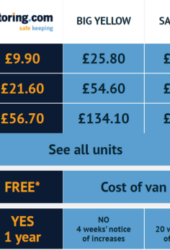By Guy Burridge
Downsizing in later life can be a liberating and practical decision, allowing you to embrace a fresh start while enjoying financial and lifestyle benefits. But it’s not always an easy process, with emotional challenges and practical considerations to navigate. Are you ready to embark on this journey? This comprehensive guide will help you understand the pros and cons of downsizing as you get older, as well as provide tips for evaluating your options and preparing for the process.
Key Takeaways
- Downsizing in later life can offer financial, lifestyle and maintenance benefits that should be carefully considered before making a decision.
- Downsizing from a large house has the potential to provide long-term financial security. Associated costs must also be taken into account.
- Adapting to a new lifestyle after downsizing requires mindful effort and communication with family members for successful transition.
Benefits of Downsizing in Later Life
As we age, our priorities and needs change. Downsizing to a smaller property can offer some attractive benefits, catering to our evolving lifestyle. The financial benefits, lifestyle improvements, and easier maintenance associated with downsizing can help you enjoy a more fulfilling and comfortable retirement.
However, you must carefully evaluate your reasons for downsizing and picture yourself in a smaller space to confirm it aligns with your long-term goals. After all, downsizing is a significant life change, and you’ll want to make the most of this opportunity.
Financial Advantages
One of the main motivations for downsizing is the potential financial benefits. By moving to a smaller property, you can:
- Release equity from your current home, which can be used to pay cash for a new, cheaper property
- Lower mortgage costs
- Reduce utility bills
- Possibly become mortgage-free, depending on property values.
Additionally, the money released from selling your larger home can be used to supplement your retirement income or fund other expenses like helping your children get onto the property ladder, providing long-term financial security whilst also supporting personal goals.
However, you must factor in the costs involved in the downsizing process, such as estate agent fees and the average price of moving costs, to confirm the decision is financially sound overall.
Lifestyle Improvements
Downsizing in later life can also lead to notable lifestyle enhancements. Some potential benefits of downsizing include:
- Relocating to a smaller house in a quieter area
- Being closer to family and friends
- Having access to community activities
- A fresh start in terms of social life
- Reduced storage costs
These factors should be on your downsizing checklist as they can significantly improve your quality of life.
Moreover, living in a smaller property can encourage a simpler, more focused lifestyle, allowing you to spend more time and energy on the things that truly matter to you, while also helping you save money.
However, you should brace yourself for potential downsizing drawbacks in your new property, including lifestyle changes, emotional challenges, the potential for compromised walking distance to amenities, limited storage space, and fluctuating property prices and costs of expensive property.
Easier Maintenance
A smaller home comes with the added benefit of easier maintenance, as there are fewer rooms and surfaces to clean. A suitable home can help you save time, effort, and spending more money on maintaining a larger property, allowing you to focus on enjoying your retirement.
If you opt for a flat or retirement village, exterior maintenance and gardening tasks are typically covered in your maintenance agreement, further reducing the burden of household tasks. In the long run, less maintenance can contribute to a more relaxed, stress-free lifestyle.
Drawbacks of Downsizing in Later Life
While the benefits of downsizing are compelling, you must take into account the potential cons of downsizing as well. Emotional challenges, limited space, and property prices and costs are some of the factors to weigh up before making a decision.
Understanding these potential challenges and preparing for them can help you make a more informed decision and ensure a smoother transition to your new home.
Emotional Challenges
Leaving a family home filled with memories and parting with possessions can be emotionally challenging. You must give yourself time to cope with these feelings and recognise that they are a natural part of the process.
Engaging in open communication with family and friends can be helpful in navigating these emotions. Additionally, focusing on the positive aspects of downsizing, such as financial advantages and lifestyle improvements, can provide motivation and encouragement throughout the process.
Limited Space
Downsizing to a smaller home, or “downsizing your home,” means having less space for personal belongings, hobbies, and activities. This might necessitate downsizing your furniture, parting with cherished items, and getting used to fewer amenities in your new home.
However, embracing the concept of “less is more” and focusing on the essentials can lead to a simpler, more streamlined lifestyle. It’s crucial to be mindful of these potential limitations and make a conscious effort to adapt to your new surroundings and living conditions.
Property Prices and Costs
Smaller homes may not always be less expensive due to factors such as demand and availability. It’s vital to investigate properties and costs in your desired location, along with the associated relocation costs, such as stamp duty, energy performance certificate fees, and conveyancing fees.
Taking the time to thoroughly evaluate these factors will help you make an informed decision about whether downsizing is the right choice for you, both financially and emotionally.
Evaluating Your Downsizing Options
Before making a decision to downsize, it’s important to explore all available options and consider which type of property best suits your needs and lifestyle. Factors to consider include:
- Maintenance responsibilities
- Service charges
- Potential retirement properties
- Your current life stage
Taking these factors into account will help you make an informed decision about downsizing.
A careful evaluation of your downsizing options will help you find the perfect smaller home that aligns with your long-term goals and strikes the right balance between financial benefits and lifestyle improvements.
Smaller Houses, Bungalows & Flats
Smaller houses, bungalows, and flats each offer their own set of benefits and drawbacks. For instance, bungalows may provide the advantage of having a good-sized garden, but will also require regular maintenance. Flats, on the other hand, can offer lower utility expenses and upkeep costs, as well as increased accessibility for those with reduced mobility; but won’t have any private outdoor space.
When evaluating these options, you must consider your individual needs and preferences, along with any accessibility requirements or maintenance responsibilities that might influence your decision.
Retirement Villages
Retirement villages are purpose-built property developments designed to provide older people with an independent lifestyle in a secure atmosphere surrounded by people of a similar age. These villages often feature communal amenities such as a swimming pool, gym, and restaurant, as well as social activities and events.
While retirement villages can be an attractive option for some, it’s essential to weigh the costs and potential restrictions before making a decision. Be sure to research various retirement villages in your desired area to find the one that best meets your needs and preferences.
Renting vs. Buying
When it comes to downsizing, you may also need to decide between renting and buying a property. Renting can offer flexibility and the opportunity to test a new location before committing long-term, while buying can provide increased stability and security, as well as the potential for building up equity in the property.
Assessing your financial situation and long-term goals is vital when making this decision. Renting may be more suitable for those who value flexibility and are unsure about their future plans, while buying might be a better option for those seeking stability and long-term financial security.
Preparing for the Downsizing Process
Once you’ve decided to downsize, it’s time to start preparing for the process. This involves decluttering and organising your belongings, timing your move, and exploring your downsizing options.
Taking the time to thoroughly prepare for this long-term commitment and downsizing process will ensure a smoother transition to your new home and minimise any potential stress or challenges associated with the move.
Decluttering and Organisation
Decluttering and organisation are essential steps before downsizing, as smaller homes have less space for possessions. This process can be challenging and time-consuming, but it’s vital to prioritise and focus on the items that hold the most importance to you.
When decluttering and organising, it’s helpful to start with small tasks, set achievable goals, and create a system for organising your belongings. This process can ultimately lead to a more streamlined, efficient, and stress-free move.
Timing Your Move
Timing your move is crucial, as factors such as emotional readiness, availability of other family members, and financial stability should all be considered. Additionally, the availability of housing in your desired area and the cost of living should be taken into account when scheduling your move.
Carefully planning and timing your move will ensure a more seamless transition to your new home, while also maximising the benefits that downsizing has to offer.
The Long-Term Impact of Downsizing
Downsizing can have a lasting impact on your life, providing financial security, adapting to a new lifestyle, and considering family implications. It’s essential to be prepared for these changes and to embrace the opportunities that downsizing presents.
Understanding the long-term implications of downsizing and making informed decisions throughout the process sets the stage for a successful and fulfilling future in your new home.
Financial Security
Financial security is a significant long-term benefit of downsizing, as it can free up funds for retirement or other expenses. Significantly cheaper mortgage costs than your current property, lower bills, and the possibility of becoming mortgage-free can all contribute to enhanced financial stability.
However, carefully considering the costs involved in the downsizing process, such as estate agent fees and moving costs, is important to ascertain if the decision is financially advantageous overall.
Family Considerations
Family considerations should be taken into account when downsizing, such as the possibility of adult children needing to live with you again or the impact on inheritance tax. Communicating openly with your loved ones about your plans and taking their needs and concerns into consideration can help ensure a smoother transition for everyone involved.
Carefully weighing these factors and making informed decisions will help you strike the right balance between the benefits of downsizing and the needs of your family.
Summary
In conclusion, downsizing in later life can be a rewarding and practical decision, offering financial advantages, lifestyle improvements, and easier maintenance. However, it’s essential to carefully consider the potential drawbacks and challenges, as well as evaluate your options and prepare for the process. By making informed decisions and embracing the opportunities that downsizing presents, you can enjoy a fulfilling and comfortable retirement in your new home.
Frequently Asked Questions
Should you downsize when you get older?
Downsizing when you get older is a great option, as it allows you to save both money and time while finding a property better suited to your needs.
What are the pros and cons of downsizing?
Downsizing can offer financial benefits, such as lower maintenance and utility costs, but may also come with downsides like moving expenses and having to dispose of treasured belongings.
Moving to a smaller home can be a difficult decision, but it can also be a great way to save money and simplify your life. It’s important to weigh the pros and cons before making a decision.
What is the best age to downsize your home?
Many over 60’s have difficulty maintaining their property and gardens so research indicates that this is the best decade of your life to downsize your home.
What are the main benefits of downsizing in later life?
Downsizing in later life can bring significant financial, lifestyle, and maintenance benefits, helping to simplify life and reduce stress.
How can I prepare for the downsizing process?
Prepare for downsizing by decluttering and organising your belongings, timing your move carefully, and evaluating all available options.









